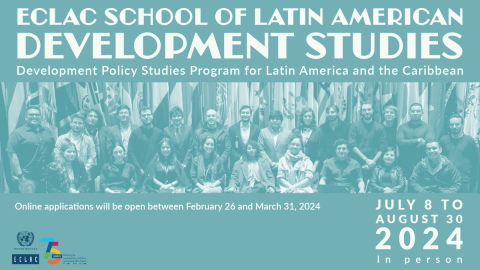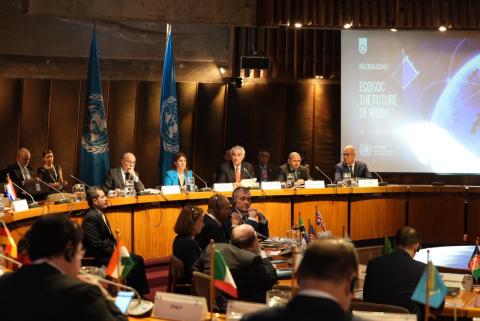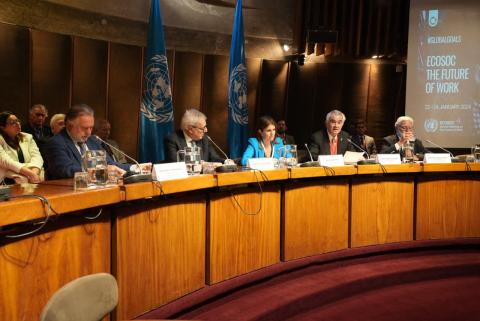Announcement
The Executive Secretary of the Economic Commission for Latin America and the Caribbean (ECLAC), Alicia Bárcena, called today for redoubling efforts to formulate evidence-based proposals that allow for lifting the burden of inequality that harms the peoples of the region and threatens the achievement of the 2030 Agenda for Sustainable Development.
In a message to ECLAC officials, in the framework of the commemoration of the 74th anniversary of the United Nations’ founding, the regional commission’s most senior representative recalled that while Latin America and the Caribbean is not the world’s poorest region, it is the most unequal.
She also reaffirmed that an effective multilateralism that recognizes equality, inclusion and sustainability as intrinsic dimensions is key to achieving the 2030 Agenda, the civilizing road map that puts equality at the center of sustainable development and is the self-imposed commitment agreed upon by 193 countries.
The following is the full text of Alicia Bárcena’s message:
Message from Alicia Bárcena, ECLAC’s Executive Secretary, in celebration of United Nations Day
Thursday, October 24, 2019
Friends:
Today we celebrate the seventy-fourth anniversary of the foundation of the United Nations, the most coordinated multilateral effort the world has ever undertaken, following the horror of two world wars, in search of the peaceful resolution of conflicts, development and the well-being of all peoples.
We commemorate this anniversary convinced that effective multilateralism, that recognizes equality, inclusion and sustainability as intrinsic dimensions, is key to achieving the 2030 Agenda, the civilizing road map that puts equality at the center of sustainable development and is the self-imposed commitment agreed upon by 193 countries.
At times like these that our region is currently facing, both the United Nations and ECLAC must redouble their efforts to formulate evidence-based proposals that will lift the burden of inequality. As we have reiterated over the last decade, Latin America and the Caribbean is not the poorest region in the world, but it is the most unequal.
To eradicate the culture of privilege that characterizes Latin America and the Caribbean, income inequality and the distribution of wealth must be addressed, as must tax evasion, which totals some US$ 340 billion a year in the region (6.7% of its GDP).
Moreover, 1 in 5 people live in slums and 48.4% of employed people in cities are in informal jobs, with no form of social security.
In Latin America, women are less likely to participate in the labor market because of their heavy unpaid domestic workload. Their labor participation rate is 24.2 percentage points lower than that of men. Gaps in human capacities undermine the full development of all people and are inefficient: 40% of young people aged between 20 and 24 years do not finish secondary education and ethnic inequalities persist.
It is a source of sadness and concern that, after years of trending downwards thanks to progressive social and labor policies, there are still 184 million people living in poverty in the region, of whom 62 million live in extreme poverty.
Leaving no one behind means focusing attention on the differences among the various population groups and areas of residence: the poverty rate in rural areas is 20 percentage points higher, while that among children and adolescents up to the age of 14 is 19 percentage points higher than among the population aged between 35 and 44 years.
As we have said and will say again: inequality is inefficient, it reproduces itself across generations and permeates the production system. By contrast, equality is not only an inescapable ethical principle, it is also a variable that explains the long-term efficiency of the economic system.
Today, the reality that these figures reflect is erupting in our region. We must listen to the voices of and develop proposals that bring satisfaction to the peoples of Latin America and the Caribbean who now demand that the development of our region’s countries includes them all, that it is based on their rights and that it recognizes the equal dignity of everyone.
We are concerned with the slow progress towards the implementation of the 2030 Agenda and its 17 Sustainable Development Goals, which constitute the most transformative multilateral agenda approved by the UN General Assembly in the past 74 years.
Yours Sincerely,
Alicia Bárcena
Executive Secretary
Economic Commission for Latin America and the Caribbean



